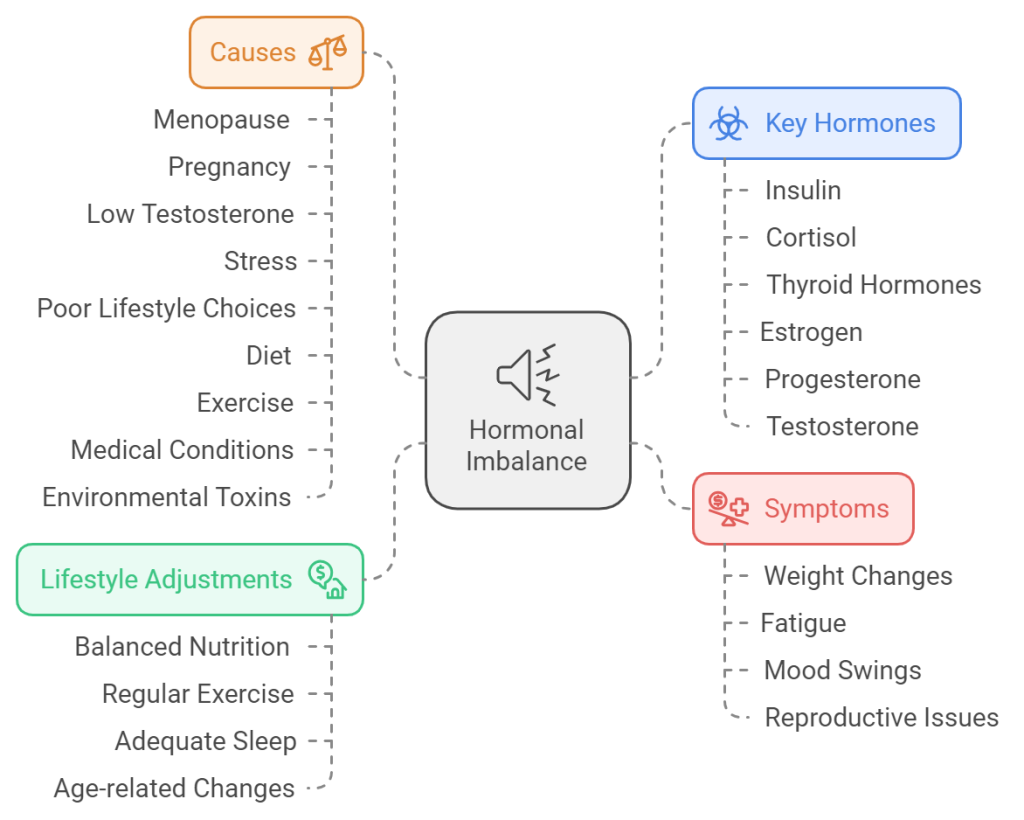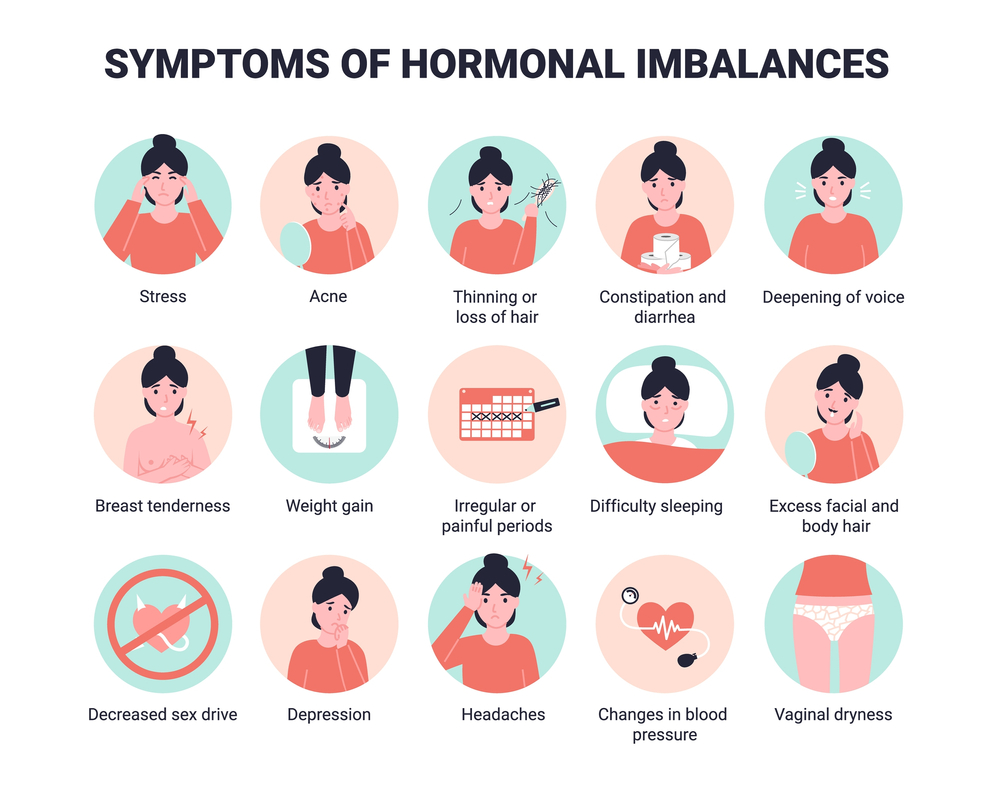Causes of hormonal imbalance happen when there is too much or too little of certain hormones in the blood.
– An imbalance can cause different physical and emotional symptoms.
– To understand what causes hormonal imbalance it’s helpful to look at factors that affect hormone levels, such as:
➡️ Lifestyle choices (like diet and exercise)
➡️ Medical conditions (such as thyroid problems)
➡️ Age-related changes (like puberty or menopause)
➡️ Environmental factors (exposure to chemicals or pollution)

Definition of hormones
Hormones are produced by different types of glands within a human being.
They performs their function in the regulation of the metabolism, growth, mood, and reproductive processes of an individual.
Hormonal imbalance occurs when the levels of hormones become either too high or too low and inhibit the normal functioning of the human body.
The Role of Hormones in the Body
Hormones function by sending signals that convey information needed to regulate various body functions.
For example:
➡️ Blood sugar is regulated by the hormone insulin.
➡️ The rate of metabolism is regulated by thyroid hormones.
➡️ Estrogen and testosterone are the most famous ones in sexual development and reproductive health.
Good health means that all hormones are kept within enough balance since slight changes may lead to enormous alterations.
Mechanism of Hormones in Regulation of the Body’s Functions
Principal Hormones:
Among various other hormones, the following have a great impact on the maintenance of body balance:
- Insulin: It regulates the blood glucose level.
- Cortisol is well-known as a “stress hormone” because it is involved in the body’s reaction to stress conditions.
- Thyroid hormones (T3, T4): They regulate metabolism and energy.
- Estrogen and Progesterone control women’s reproductive health
- Testosterone controls male sexuality and muscle tone.
Proper levels of the hormones will keep the body working correctly
Importance of Hormone Balance
When your hormones are balanced, they all work together to enable your physical and mental well-being. On the other hand, if your hormones are out of balance, very serious health problems such as diabetes, thyroid conditions, and infertility may occur.
Common Symptoms of Hormonal Imbalance
The symptoms of hormonal imbalance vary depending on the type of hormonal interference. The symptoms differ between men and women, though some features apply to both sexes.
- Physical Symptoms
➡️ Weight gain/loss: Thyroid problems or cortisol imbalance may cause mysterious weight gain/loss.
➡️ Fatigue: Low energy could be observed in conditions such as thyroid disorders or adrenal fatigue.
➡️ Skin disorders: Acne, dry skin, or skin rashes can be evidence of hormonal changes.
➡️ Gastrointestinal issues: Hormonal changes can lead to bloating, constipation, or diarrhea.
2. Emotional and Cognitive Symptoms
➡️ Mood swings: Changes in hormones, such as those related to estrogen or cortisol imbalances, might result in irritability and mood swings.
➡️ Anxiety and depression: Hormonal imbalance is considered one of the causative factors in the onset of mental disorders.
➡️ Impaired concentration: Thyroid hormone, when available in lesser quantities, impairs cognitive functions.
3. Signs Specific to Men and Women
➡️ Women: irregular menstrual cycles, hot flashes, and night sweats.
➡️ Men: low libido, erectile dysfunction, muscle weakness.

What causes of hormonal imbalance?
Most people will face natural periods of hormonal imbalance at certain points in their lives. Hormonal imbalances can occur when the endocrine glands are not working properly.
Endocrine glands are one kind of cells that generate, stocks and release hormones into the blood. There are several endocrine glands located throughout the body that control different organs, including the:
- adrenal glands
- gonads (testis and ovaries)
- pineal gland
- pituitary gland
- hypothalamus gland
- thyroid and parathyroid glands
- pancreatic islets
Causes of hormonal imbalance in women:
Women naturally experience several periods of hormonal imbalance throughout their lives, including:
- Puberty
- Menstruation
- Pregnancy, childbirth and nursing
- Perimenopause, menopause and postmenopause
Menopause
A woman’s ovaries, during the time of menopause, make less estrogen and progesterone. This leads to a natural fall in the levels of hormones, giving way to symptoms that might include hot flashes, night sweats, and mood swings.
Polycystic Ovary Syndrome
- PCOS is a common condition wherein the ovaries produce higher-than-normal levels of androgens, or male hormones, responsible for irregular periods, weight gain, and hair growth.
- Pregnancy and Postpartum Hormonal Shifts Pregnancy is a time of great hormonal change, and some women may also develop imbalances following childbirth, such as postpartum depression.
- Birth Control and Hormone-Based Medications Hormonal birth control methods can affect levels of estrogen and progesterone and may lead to mood changes, weight gain, and other symptoms.
Women are more likely to have different hormone imbalance disorders than men because they have different endocrine organs and cycles.
Causes of Hormonal Imbalance in Men
Most hormonal imbalances in men are related to the endocrine organs responsible for the production of male sex hormones. This includes testosterone.
- Andropause (Male Menopause)
As men get older, the amount of testosterone produced gradually decreases. This can lead to symptoms that include tiredness, low libido, and feelings of mood alteration. For this reason, it is sometimes also known as andropause.
2. Low Levels of Testosterone
The inability to produce enough testosterone-a condition termed hypogonadism-can affect males of any age. This is a result of injury to the testes, infection, or other chronic diseases.
3. Stress-Related Changes to Cortisol
Chronic stress increases cortisol levels, which can interfere with other hormones, such as testosterone and thyroid hormones.
Lifestyle Factors Contributing to Hormonal Imbalance
1. Poor Diet and Nutrition
A diet filled with sugar, refined carbs, and processed foods disrupts the normal levels of hormones, especially insulin. Inadequate intake of healthy fats is equally disruptive to hormone production since fats are a building block for producing hormones.
2. Sedentary Lifestyle vs. Excessive Exercise
This also predisposes to obesity and insulin resistance, conditions that increase the risk of hormonal imbalance. In addition, too much exercise could cause an elevation of cortisol levels and a suppression of reproductive hormones.
3. Chronic Stress and Sleep Disturbances
Long-term stress affects the release of stress hormones, such as cortisol, and upsets the balance of other hormones. Sleep disorders interfere with hormone secretion, including those important in the metabolic processes and in regulating appetite.
Read more about- Exploring 8 Things That Slow Down Metabolism
Medical Conditions that Cause Hormonal Imbalance
1. Thyroid Disorders-
An underactive and overactive thyroid can have a huge impact on metabolism. Energy levels and body temperature are affected because of an imbalance in thyroid hormones.
2. Diabetes and Insulin Resistance-
Insulin resistance, common in type 2 diabetes, makes it hard for the body to control blood sugar, leading to more hormonal imbalances.
Cushing’s syndrome and Addison’s disease are rare problems with the adrenal glands:
- Cushing’s syndrome causes too much cortisol production.
- Addison’s disease leads to too little cortisol.
3. Environmental factors affecting hormones include:
Exposure to harmful chemicals in plastics, pesticides, and cosmetics, can act like or disrupt natural hormones, causing imbalances.
- The Impact of Pollution and Toxins
Pollutants in the air and water can interfere with hormonal health by affecting the endocrine system.
- Household Chemicals in Hormone Disruption
Most home products have chemicals that may act as endocrine disruptors. These are related to phthalates and parabens common in cleaning agents and personal care products.
4. Age-Related Hormonal Changes
- Hormonal Shifts During Puberty
It is that time of year-to-year change in the levels of hormones as the body prepares to reach sexual maturity.
- Aging and Hormonal Decline
The levels of some hormones naturally decline with age. These include growth hormone, estrogen, and testosterone.
5. Effects of Menopause and Andropause on Hormone Imbalance
Both are age-related hormonal conditions that might be responsible for causing a disturbance in mood, energy, and overall health.
6. Effects of Diet on Hormone Imbalance
- Sugar and Processed Food Intake
Too much sugar is consumed, which can lead to insulin resistance. Most of the processed foods contain the wrong kind of fat, which interferes negatively with the production of hormones.
- Healthy Fats and Proteins
Sufficient amounts of protein are necessary to help in growth and repair.
Consuming sufficient amounts of healthy fats, such as omega-3 fatty acids, is important to support hormone production.
- Caffeine, Alcohol, and Stimulants
The excessive use of stimulants like caffeine and alcohol impacts the levels of too many hormones and interferes with sleep patterns, making imbalances likely.
How Sleep Plays a Part in Maintaining Hormone Balance
Sleep helps to keep many hormones balanced, which regulates your stress, hunger, and metabolic rate.
Normal sleep-wake cycles help keep hormones like growth hormone and melatonin at healthy levels.
Sleep deficiency raises cortisol levels and interferes with a number of hormones that help to regulate hunger and fullness. From the standpoint of hormonal balance, the effects of exercise are pretty significant.
How Exercise Affects Hormones
- Regular training normalizes hormones; too much training upsets the balance.
- Moderate exercises promote the release of good hormones, such as endorphins, and lower the levels of stress hormones.
- Too many workouts elevate cortisol and decrease the levels of reproductive hormones such as estrogen and testosterone.
Are hormonal imbalances curable?
Many hormonal imbalances can be managed or treated through lifestyle changes, medications, or hormone therapy.
Can stress cause hormonal imbalance?
Yes, chronic stress raises cortisol levels, disrupting other hormones.
Do hormonal imbalances affect fertility?
Yes, they can impact reproductive hormones, making it harder to conceive.
